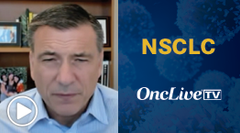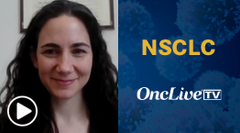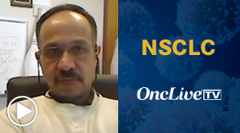
Dr. Heymach on the Efficacy of Mobocertinib in EGFR Exon 20 Insertion–Mutated NSCLC
John V. Heymach, MD, PhD, discusses the efficacy of mobocertinib in EGFR exon 20 insertion–mutated advanced non–small cell lung cancer.
John V. Heymach, MD, PhD, chair, professor, and David Bruton Jr. Chair in Cancer Research, Department of Thoracic/Head and Neck Medical Oncology, professor, Department of Cancer Biology, Division of Cancer Medicine, The University of Texas MD Anderson Cancer Center, discusses the efficacy of mobocertinib (TAK-788) in EGFR exon 20 insertion–mutated advanced non–small cell lung cancer (NSCLC).
During the International Association for the Study of Lung Cancer (IASLC) 2020 World Conference on Lung Cancer, findings from an ongoing phase 1/2 study (NCT04535557) were presented and showed clinically meaningful activity with mobocertinib in patients with previously treated, metastatic NSCLC who harbor EGFR exon 20 insertion mutations, says Heymach. The confirmed objective response rate was 26% per an independent review committee, and the median progression-free survival was 7.3 months.
Although a lower incidence of skin toxicities was observed compared with other investigational drugs in this space, gastrointestinal adverse effects, including diarrhea, nausea, vomiting, decreased appetite, and stomatitis, accounted for most treatment discontinuations.
Ultimately, these findings are encouraging and represent clear evidence of activity with mobocertinib, says Heymach. Although investigators are hopeful that agents with more robust clinical efficacy will emerge in this space, mobocertinib has demonstrated improved response rates compared with first- and second-generation agents that were investigated for this subtype of metastatic NSCLC, concludes Heymach.


















































